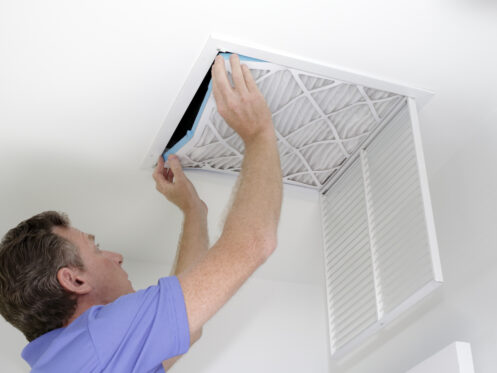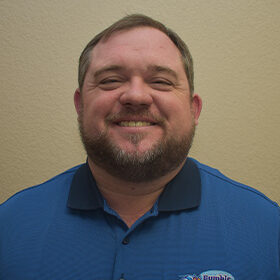In Las Vegas, NV, your air conditioner is a necessity when summer temperatures increase. Nothing ruins that refreshing burst of cold air faster than a foul, musty smell drifting through your vents. While it might seem harmless, a stale smell from your air conditioning unit is usually a sign that something’s not functioning normally inside your system. Ignoring this smell in your home could create discomfort, cost you money, or cause health issues. Let’s break down why your air conditioner might smell musty and how to fix it for good.
Reasons for a Musty AC and How to Get Rid of It
Your air conditioner naturally removes heat and humidity from your indoor air. If moisture doesn’t drain properly, it can cause issues. A musty smell is almost always associated with excess moisture, bacterial growth, or mold inside the system. A few simple habits and professional AC maintenance from our team at Bumble Breeze at least once a year help keep your system and your indoor air clean and fresh.
Air Filter Clogs
In dusty, dry climates like Las Vegas, air filters trap not only dust and pollen but also tiny sand and dirt particles that blow in during windstorms. Over time, your filters will clog with dirt and moisture. When air passes through a dirty filter, it carries that stale, musty odor into your living spaces. If your AC smells musty when it kicks on, replacing your filter is a simple first step.
In Las Vegas, it is important to check your air filter approximately once a month when using your cooling system daily. During windy or dusty periods, you may need to change it every few weeks. Look for visible clumping of debris on the surface of the filter. Check to see if light can still pass through the filter. Ensure that you choose a filter that works with your specific system to ensure dust removal.
A high-quality filter traps more dust and moisture, keeping your system clean on the inside. Ideally, to keep fine dust particles and allergens out of your home, you will need a pleated filter with a MERV (Minimum Efficiency Reporting Value) rating that is between 8 and 12. Don’t use a filter rated above 12 without confirming that your HVAC system can handle that airflow restriction. You risk potential damage to your equipment with a high-rated filter.
Dirty Condensate Drain Line
Your cooling unit’s evaporator coil removes humidity, and that moisture drains away through a condensate line. However, when that line becomes blocked by dirt, algae, or debris, water backs up and accumulates inside the unit. Standing water is a place for mold, mildew, and bacteria to grow, which produce a stale smell.
Prevent water build-up in your system by flushing your unit’s condensate line every few months. If you’re unsure how to do this, ask one of our HVAC technicians to demonstrate it during your next maintenance session. You often won’t notice a blocked drain line until you see water leaks or smell a musty odor. Regular cleaning helps, but if you suspect a blockage, contact our team at Bumble Breeze so one of our technicians can safely clear the line. This is a task we can include in annual maintenance as well.
Moisture in the Ductwork
Even in the desert, ducting can trap moisture, especially if your ductwork has small leaks or poor insulation. When moist air encounters cold duct walls, condensation can form, creating the perfect environment for mold and mildew to grow. If that stale smell seems to come from multiple vents throughout your house, moisture in your ducts could be the culprit. You can schedule a duct cleaning every three to five years to address microbial growth and other contaminants. A routine inspection of your ducting can help spot any damage that is allowing moisture to enter your ducting.
If you haven’t taken the time to schedule a professional cleaning of the ductwork in your home for many years, it might hold layers of dust, debris, and hidden moisture. When our team does a professional duct cleaning, we remove these contaminants, improve your indoor air quality, and help your system run more efficiently.
Dirty Evaporator Coils
Your evaporator coil removes heat and humidity from the air inside your home. However, when dust and dirt accumulate on the coil, it can’t remove moisture effectively. Water droplets cling to the coil, providing a convenient environment for mold and mildew to grow. Since the evaporator coil is deep inside the system, you will need professional assistance from one of our HVAC technicians to inspect and clean it. Keeping your coils clean also improves your system’s energy efficiency.
Standing Water from Leaks
Sometimes a musty smell doesn’t come from inside your cooling unit but from leaks or standing water around it. If you have a rooftop unit or a split system in your attic, a clogged drain pan or a damaged drain line can leave hidden puddles that foster mold growth. That stale odor can then travel through your vents every time the system runs.
Poor Ventilation and Humidity Control
Even though Las Vegas experiences relatively dry conditions outdoors, indoor humidity can still build up when you seal your home tightly to keep out the heat. Make use of the exhaust fans in your bathroom and your kitchen to remove excess moisture from your living space. Seal and insulate your ducts to prevent condensation buildup.
Relative humidity in your home should always remain between 30% and 50%. If you maintain a tight home envelope and humidity remains stagnant from things like bathing, cooking, and cleaning, it’s easy for relative humidity to rise. In some cases, a whole-home dehumidifier can help keep your system dry and odor-free. This equipment installs directly onto your HVAC system and removes moisture from the air that is passing through your HVAC system. The efficiency of this setup is much better than attempting to use a portable dehumidifier that needs to be moved from one location to another. Also, whole-home units don’t require daily emptying as they have a dedicated drain line. You’ll just want to make sure that you keep this drain line clear, just as you do with your HVAC condensate line.
Are you a new homeowner? This is what those strange smells and HVAC noises could mean >>>
What That Musty Smell Means for Your Home
A musty smell is more than a minor annoyance. Mold and mildew growth inside your HVAC system can send mold spores and bacteria into your air supply. Over time, this can trigger allergies or asthma symptoms, headaches, respiratory problems, chronic fatigue, and systemic inflammation. This is especially harmful for small children, older adults, or anyone with a compromised immune system. If a musty smell indicates high levels of humidity in your home, this can mean you have a high concentration of other contaminants as well.
Breathe Fresh Air All Summer with Our Help
If you can’t get the musty smell to stop lingering, don’t wait to call Bumble Breeze. We can inspect your entire system for hidden moisture problems, mold growth, or leaks that you might miss. We’ll also check for larger issues, such as refrigerant leaks, clogged coils, or poor drainage, which can all shorten your AC’s lifespan if left unaddressed. Contact Bumble Breeze today to schedule an appointment in Las Vegas today.


